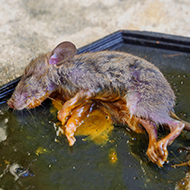Government supports glue trap ban

Glue traps cause immense suffering to rodents and other animals, including pets.
A cruel method of pest control could become a thing of the past thanks to new legislation being introduced by the government.
Glue traps are commonly used in the UK as a low-cost way to ensnare rodents. However, the traps cause immense suffering to animals, with many of those captured remaining alive for more than 24 hours.
Pets and other wildlife have also found themselves caught up in the traps. In the past five years alone, the RSPCA has received more than 200 reports of wild birds, hedgehogs and pet cats getting stuck in them.
Now a new bill has been introduced that seeks to clamp down on the use of glue traps to catch rodents. Entitled ‘The Glue Traps (Offences) Bill’, the measure is one of several new laws being introduced by Defra under its Action Plan for Animal Welfare.
Introducing the Bill, MP Jane Stevenson said: “When pest control is needed we have a responsibility to use the most humane methods in order to prevent unnecessary suffering. A rodent stuck in a glue trap will suffer a slow and painful death, which isn’t acceptable when other pest control methods are available.
“Glue traps don’t just capture rodents. Other animals injured or killed by these traps include pet cats, birds, owls, bats, fox cubs and hedgehogs. It is surely time to end the use of these inhumane and indiscriminate traps.”
Glue traps are widely regarded as inhumane, and it is a requirement under the 2006 Animal Welfare Act that animals captured must not undergo needless suffering.
BVA’s policy statement on glue traps emphasises how rodents stuck in glue can suffer from dehydration, hunger, torn skin and broken limbs, and ultimately death.
Welcoming the Bill, RSPCA chief executive Chris Sherwood said: “We are absolutely delighted to see the first steps towards a ban of torturous glue traps which cause such suffering and misery to animals.
“Our frontline rescuers and hospital staff are sickened by the horrific injuries animals suffer as they struggle to free themselves. Mice and rats are the main victims, but other animals such as snakes, robins, owls and even kittens and cats maimed or fatally injured because of these awful traps.
“We applaud Jane Stevenson in her mission to ban these traps and are pleased to see this bill has Government support. We believe the public want to see traps like this banned and hope this bill progresses through parliament quickly so we can consign glue traps to the history books for good.”



 The Veterinary Medicines Directorate (VMD) is inviting applications from veterinary students to attend a one-week extramural studies (EMS) placement in July 2026.
The Veterinary Medicines Directorate (VMD) is inviting applications from veterinary students to attend a one-week extramural studies (EMS) placement in July 2026.